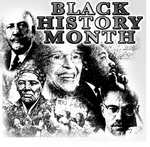
Reprinted from politicalaffairs.net
This February, as we celebrate African American history month, the first African American president will be sitting in the White House, something that few Americans saw as a possibility at the turn of the 21st century. Because of this momentous event, it is worth saying a few words about the origins of African American history month.
Carter G. Woodson, a pioneer student of African American history, started the concept of a Negro History Week in 1926, when Calvin Coolidge was president and the KKK was still a major force. Woodson himself, a member of W.E.B. Du Bois’s generation, was a remarkable personality. Born in Virginia in 1875 as Reconstruction was ending, Woodson was the son of former slaves who had aided General Grants army as they advanced against Robert E. Lees retreating Army of Northern Virginia in the final phase of the Civil War.
Woodsons family moved to pro-Union West Virginia when he was a boy and he worked as a miner, dedicating himself to achieving higher education. At the age of 20, he entered the segregated Frederick Douglass High School, earned his diploma in two years and became a teacher. After earning BA degree from Berea College in Kentucky in 1900, Woodson traveled to US-occupied Philippines and a took a position as the principal of a high school there. As was often true in colonial situations, individuals from working class and minority backgrounds were given much much greater opportunities in colonies then they were at home.
Subsequently, Woodson was promoted to school supervisor there, a position he held from 1903 to 1907. After his return to the US, Woodson earned a Masters degree from the University of Chicago and a Ph.D. from Harvard, which, given the depth of the discrimination against African Americans in higher education all forms of higher education at the time were great achievements.
In 1915, Woodson co-founded The Association for the Study of Negro Life and History, which was a conscious response by African American intellectuals to the significant upsurge in racism in the US during the Wilson administration. A year later, he founded the Journal of Negro History, which became the most important scholarly publication dealing with African American history for generations.
Woodson dedicated his life to the creation of what progressive historian Charles Beard called a usable past for African Americans and European Americans. Americans. Through this work, Woodson sought to reject both the crude racist distortions and general omission of African Americans which dominated the broader narrative of US history. No Marxist or communist, Woodson held and represented progressive progressive views in a society that denied African Americans the right to be much of anything except to be part of the Negro problem.
As a scholar and active NAACP member, he communicated extensively with W.E.B. Du Bois, the premier African American scholar and intellectual of both his era and the whole 20th century. Woodson was also close with the West Indian-born radical, Hubert Harrison, and many others in the post World War I African American and African Diaspora left. In 1926, he established Negro History Week, hoping to mobilize both the African American press and sympathetic progressive media around the study of African American History. He chose February in which to celebrate this week because it was the birthday of both Frederick Douglass and Abraham Lincoln.
Through the historical association he helped to found, Woodson encouraged the teaching and integration of African American history into public school curricula until his death in 1950. In addition, Woodson worked hard to direct the creation of an ‘Encyclopedia Africana’ which remained unfinished at the time of his death. Woodson was a scholar first and foremost, not a political activist like Du Bois, Harrison, and others. Unfortunately, the developing Cold War at the time of his passing set back the struggle for African American equality in the short run and pushed back Woodsons lifelong commitment to bring the study and teaching of African American history into higher education.
The Civil Rights movement, however, changed that. A new generation of scholar-activists urged that Negro History Week be turned into Black History Month in 1976 by the association Woodson helped to found (then called the Association for Afro-American Life and History). Today’s African American history month and African American Studies programs in colleges and universities all over the country and the world, along with other Ethnic Studies and African Diaspora Studies programs are a direct legacy of Woodson’s life-long work.
African American history month, despite objections to it by conservatives on the grounds that one group should not have a month dedicated to it, remains an important expression of cultural pluralism in the best sense. The history of African Americans, the rich and vital contributions that African American individuals, organizations and the whole African American community have made to the labor movement, the struggle for civil rights, the arts, sciences and professions, and mass culture is necessary to understanding all of US history. The national celebration of African American history month has helped to defeat the erroneous notion long expressed by conservative establishments that African Americans had no history beyond chattel slavery, which was to be forgotten along with African American people themselves after the Civil War.
US history is largely hollow without African American history and African American history has no context and cannot be understood outside US history. The Obama presidency is both a major event in US history and African American history, expressing the unity between the two. African American History Month should be seen as a way to enrich and strengthen both, not a reason to simply collapse one into the other.
Norman Markowitz is a contributing editor of Political Affairs.

 Join Now
Join Now